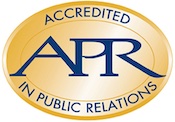It’s “open season” for PR people on editors via services like Vocus, Cision, PR Newswire and BusinessWire. But memberships of PR groups are a closely guarded secret. Our Spam Quarantine Summary for the week ended April 10 reported blocking 1,100 e-mails from commercial interests. Many of them were from the four companies named above.
Our Spam Quarantine Summary for the week ended April 10 reported blocking 1,100 e-mails from commercial interests. Many of them were from the four companies named above.
Not only are editors’ names, e-mails, phones, addresses and even cell-phones for sale by the four, but also personal info such as spouses, schools attended, hobbies, clubs and perhaps a dossier showing editorial track record.
However, when it comes to editors seeking info on PR contacts, it’s an entirely different story.
Membership lists of virtually every PR group we know of are off-limits to non-members including PR Society of America and its 110 chapters, Int’l Assn. of Business Communicators, PR Seminar, National Investor Relations Institute and local Publicity Clubs. All except PR Seminar used to publish membership directories that anyone could purchase. That was about ten years ago for most of the above. “Contact” points on corporate websites rarely provide a name or direct e-mail but instruct reporters to place a question in box.
O’Dwyer Co. Seeks PRSA Membership
The O’Dwyer Co. seeks to break this PR Maginot line by obtaining membership in the PR Society which has 22,000 members. We’re being rebuffed thus far but have not given up.
The Society’s former membership “Blue Book” in the early 2000’s was made available at no cost to reporters and was a goldmine of useful information—PR people sorted by name, employer and geographically. The Society stopped publishing it after the 2005 edition, a decision that was not run by its Assembly.
If the Society conducted a secure e-mail vote using Cordorcet or some other system, we’re sure the members would vote by a large margin to have their directory back in printed or PDF form. They would trade it for printed Tactics and Strategist which would be in PDF form (as they are now for new members).
Cision, Vocus, PRN, BW Bankroll PRSA
Part of our case for membership rests on the favoritism shown by the PR Society towards Cision, Vocus, PRN and BW, the perennial “gold” ($20,000) sponsors of the annual Society conference.
Staffers of these supplier firms are members of the Society which at the same time prohibits reporters from joining. PRN has 17 employees who are Society members while BW has 12 who are members. The Society at one time did not allow people from suppliers as members.
BW employees Tom O’Connell and Katie Kennedy are on the boards of their respective chapters, Detroit and Cleveland.
The Society is blocking our membership because we’re a reporter. But who isn’t these days? Lines are either blurring or wiped out between PR and reporting because of economic pressures. PR people are performing editorial duties via “sponsored content.” Writers have to work both sides of the street if they want to survive.
About 90 or nearly one-third of the membership of the New York Financial Writers Assn. are “freelance.” No doubt many are working for companies or PR firms since the news hole has greatly shrunk.
Cision Becomes PR News Medium
Cision announced April 11 that its blog is “taking the next step in media and PR industry coverage” by covering “the latest news in the PR, marketing and media industries.”
The “refined” blog will help users to “better navigate the ever-evolving media and PR industries with in-depth industry coverage, media and PR industry updates, best practices and advice from journalists, carefully curated top lists, and reporting on international influencers and trends.” (emphasis added).
We welcome additional reporting on the PR industry because most of the remaining PR media (seven have gone out of business in recent years) sound like the PR equivalent of Martha Stewart, whose stock-in-trade is helpful hints for housework, decorating, food, fashion, etc. “How-to” articles and themes dominate such media.
If Cision employees can be members of the Society, then so should reporters from other media. O’Dwyer membership in the Society would end all attempts to frustrate coverage. We could access the quarterly and annual financial statements; research the membership lists; attend all events at the national conference, and audit the member teleconferences. No charges whatever could be leveled against us because the Society’s bylaws forbid any “enforcement” unless a member has been “sanctioned by a government agency or convicted in a court of law,” neither of which apply to us.
Cision, Vocus Have Their Problems
Selling editor contact points is not a bed of roses these days.
Cision saw Q3/2013 revenue fall 12% to $31.8 million as net loss rose to $49.6M because of a write-down of goodwill in North America. CEO Peter Granat cited a decline in the traditional print and broadcast monitoring business in Canada. Q4 revenue fell 11% to $33M.
GTCR Investment of Chicago offered Cision a takeover price that would be a 50% premium on its Stockholm-traded shares. The company has not yet accepted it and GTCR is acquiring Vocus in a cash transaction estimated at $447M.
Vocus lost $21.8M in 2013 following a loss of $23.6M in 2012. Revenues rose 1% in 2013 to $187M. Vocus stockholders will receive $18 for each share, a 48% premium over the April 4 closing price.
Vocus CEO Rick Rudman and CFO Stephen Vintz own a combined 27.5% of the company. The sale is expected to be completed by the end of April.


 PRSA-NY today announced its five honorary co-chairs for its Big Apple Awards ceremony gala slated for TAO Downtown on Nov. 15.
PRSA-NY today announced its five honorary co-chairs for its Big Apple Awards ceremony gala slated for TAO Downtown on Nov. 15. PRSA-NY president Carmella Glover today issued a "heartfelt apology" on behalf of the chapter for her Oct. 14 message that "caused disappointment and hurt to some of our valued members."
PRSA-NY president Carmella Glover today issued a "heartfelt apology" on behalf of the chapter for her Oct. 14 message that "caused disappointment and hurt to some of our valued members." The leadership of Public Relations Society of America is backing a move to change the current “must-have” APR accreditation to “strongly preferred” as a requirement for a seat on its board of directors.
The leadership of Public Relations Society of America is backing a move to change the current “must-have” APR accreditation to “strongly preferred” as a requirement for a seat on its board of directors. Public Relations Society of American today named Linda Thomas Brooks CEO, succeeding CFO Phil Bonaventura, interim chief since July 2019.
Public Relations Society of American today named Linda Thomas Brooks CEO, succeeding CFO Phil Bonaventura, interim chief since July 2019.


 Have a comment? Send it to
Have a comment? Send it to 
No comments have been submitted for this story yet.